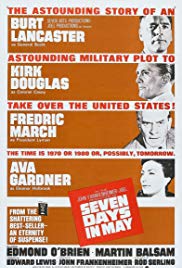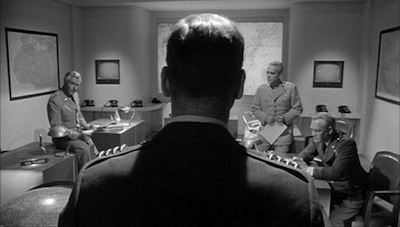SEVEN DAYS IN MAY
SUBJECTS — U.S./1945 – 1991;
SOCIAL-EMOTIONAL LEARNING — Rebellion;
MORAL-ETHICAL EMPHASIS — Trustworthiness; Responsibility.
AGE: 12+; No MPAA Rating;
Drama; 1964; 118 minutes; B & W. Available from Amazon.com.
There is NO AI content on this website. All content on TeachWithMovies.org has been written by human beings.

SUBJECTS — U.S./1945 – 1991;
SOCIAL-EMOTIONAL LEARNING — Rebellion;
MORAL-ETHICAL EMPHASIS — Trustworthiness; Responsibility.
AGE: 12+; No MPAA Rating;
Drama; 1964; 118 minutes; B & W. Available from Amazon.com.
The time is the Cold War. The President has signed a treaty with the Soviet Union requiring both countries to destroy their nuclear weapons. The polls show the treaty to be unpopular. The charismatic Chairman of the Joint Chiefs of Staff believes that the Soviets will cheat and launch a nuclear surprise attack which would kill hundreds of millions and destroy the United States. He is a man of action ….
The plot of this film is not as wild as it seems at first glance. There have been times when the military establishment disagreed strongly with the policy of the President. On at least one occasion, a high ranking military officer defied the Commander in Chief. Douglas MacArthur commanded U.S. troops during the Korean War and was a very popular figure in the U.S. MacArthur sought to expand the conflict to China at the same time that President Truman, intent on avoiding WWIII, worked to limit the scope of the war. Truman promptly fired MacArthur, reasserting civilian control over the military. Another documented occasion of disagreement was during the Cuban Missile Crisis. In 1962 the Soviet Union secretly placed nuclear missiles in Cuba. President Kennedy required the U.S. government to respond in a measured way and did everything he could to avoid nuclear war. The situation was so tense that one misstep could have caused a general war. Many elements in the U.S. military thought that Kennedy was not being aggressive enough. They thought his policy was poor, almost suicidal. They strongly advocated steps that would have led to a general war. Fortunately, on this occasion, the military obeyed the Commander in Chief (the President). See Learning Guide to “Thirteen Days“, which presents the conflict in a somewhat exaggerated fashion.
Selected Awards: 1965 Golden Globe Awards: Best Supporting Actor (O’Brien); 1964 Academy Award Nominations: Best Supporting Actor (O’Brien); Best Art Direction/Set Decoration (B & W).
Featured Actors: Burt Lancaster, Kirk Douglas, Edmond O’Brien, Fredric March, Ava Gardner, John Houseman.
Director: John Frankenheimer.
The novel and ultimately the movie was created when, as the U.S. and the U.S.S.R. took limited steps to stop the spread of nuclear weapons, right-wing ideologues began making irresponsible statements that, if put into practice, would inevitably lead to the destruction of the government. The novelist decided to take them at their word and build on what would happen if they acted on what they said. Before watching the film review the Helpful Background section. After watching the film ask and help your child to answer the Quick Discussion Question.

Treaties become law when proposed by the President and approved by a 2/3rds vote of the Senate.
The Constitution of the United States provides that the President is the Commander in Chief of the armed forces. The military has no role in politics under the Constitution. To their great glory, the armed forces of the United States have, in the end, always adhered to this rule. The people of the U.S., for the most part, understand this relationship and do not permit the military to intervene in political decisions. But there have been times when civilian control over the armed forces has been tested. The most dangerous crisis was brought on by General Douglas MacArthur, commander of U.S. forces during the Korean War and one of the most distinguished and brilliant generals ever to have served in the U.S. Army. When the Chinese sent an army to help the North Koreans, General MacArthur wanted to widen the war and, for example, use nuclear weapons to neutralize the numerical advantage of the Chinese. President Truman wanted to win the war but he also knew that using nuclear weapons on China could lead to World War III. MacArthur and his position on this issue were very popular in the U.S.; probably, at the time, more popular than President Truman. MacArthur acted on his own, defied the President, and took steps to widen the war. President Truman had a simple response, he fired MacArthur. He was supported in this by the Joint Chiefs of Staff. While the move was unpopular at the time, historians now recognize Truman’s decision as essential to preserving the constitutional power of the Presidency, assuring civilian control over the military, and preventing a widening of the War. See PBS: The American Experience: Senate Hearings on Korea (May-June, 1951). (We are not saying that Douglas MacArthur contemplated a coup against the government of the United States. He is, however, the only U.S. military officer that we know of who wilfully disobeyed a president resulting in a war much wider than the president wanted to fight.)
Popular retired generals have run for office and have been elected President, among them George Washington, Andrew Jackson, Ulysses S. Grant, Theodore Roosevelt and Dwight D. Eisenhower. But all of them ran for office as civilian politicians and not as generals. Douglas MacArthur tried for the Republican party’s presidential nomination, but by the time of the convention his popularity had waned.
During the Cold War there were people on the right wing of the political spectrum who felt that the civilian leaders of the country (from both major political parties) were soft on communism and selling the country out. Certain military men were prominent in these circles. The tension of the times, including the threat from Russia and the fact that each country had hundreds of nuclear warheads pointed at the other, led to some hysterical pronouncements by these public figures, especially when the government was considering a nuclear disarmament treaty. The inspiration for the book Seven Days in May came from that rhetoric.
The Strategic Arms Limitation Talks (SALT I) began in 1969. In May 1972 President Nixon, on a visit to Moscow, signed treaties limiting the number of offensive missile launchers (Interim Agreement on the Limitation of Strategic Offensive Arms) and antiballistic missile systems (ABM Treaty). A second round of SALT talks, called SALT II, lasted from 1972 to 1979. The SALT II treaty of 1979, which imposed specific limits on the numbers of strategic weapons, evoked strong resistance and was not ratified by the Senate until November 1994, after the collapse of the Soviet Union. Nonetheless, the U.S. and the Society Union abided by the terms of the treaty.
Since the end of the Cold War, the U.S. and Russia have signed several arms control treaties. The U.S. is paying billions of dollars to Russia to ensure that its nuclear weapons are safely destroyed and do not fall into the hands of terrorists.
What should citizens of the United States have done had the coup planned in this movie been attempted? Remember, the coup plotters would have had control of nuclear weapons, the Army, the Air Force, the Marines, and the Navy.
Suggested Response:
The only solution would have been nonviolent mass action (also known as civil disobedience). There is ample precedent to believe that this would have worked. In the 1930s and 1940s, the Indian people used mass nonviolent action to gain independence from the British Empire. The youth of Soweto used boycotts and protests to bring down the white apartheid government of South Africa. The Russian people caused the collapse of the Soviet Union by peacefully resisting the Red Army’s attempt to take the Russian parliament building in 1991. Massive peaceful demonstrations by the Philippine people brought down the dictator, Ferdinand Marcos. These are just a few examples. For more on the power of nonviolent mass action, see Learning Guide to “A Force More Powerful”.
1. See Discussion Questions for Use With any Film that is a Work of Fiction.
2. Who was the real enemy here? Was it General Scott or the hysteria caused by the risks of nuclear war?
Discussion Questions Relating to Ethical Issues will facilitate the use of this film to teach ethical principles and critical viewing. Additional questions are set out below.
(Be honest; Don’t deceive, cheat or steal; Be reliable — do what you say you’ll do; Have the courage to do the right thing; Build a good reputation; Be loyal — stand by your family, friends and country)
1. Who was the most patriotic person in this film? Justify your answer.
2. Was General Scott loyal to his country?
(Do what you are supposed to do; Persevere: keep on trying!; Always do your best; Use self-control; Be self-disciplined; Think before you act — consider the consequences; Be accountable for your choices)
3. Evaluate General Scott’s actions in light of this Pillar of Character.
4. Why didn’t the President publish General Scott’s love letters? What would you have done with General Scott’s love letters? Why?
5. What should the President have done about the admiral who signed the confession and then lied about it? Do you think that this admiral had the airplane carrying the President’s aide shot down over Spain?
6. Why didn’t the President tell the American people that the military had attempted a coup? Was this the right decision?
coup, Gallup Poll, nuclear disarmament, goose step, rain check, Judas.
For a comedic treatment of the hysteria of the era, see “The Russians Are Coming! The Russians Are Coming!”.
See links relating to the Cold War in the Learning Guide to Thirteen Days.
In addition to websites which may be linked in the Guide and selected film reviews listed on the Movie Review Query Engine, the following resources were consulted in the preparation of this Learning Guide: